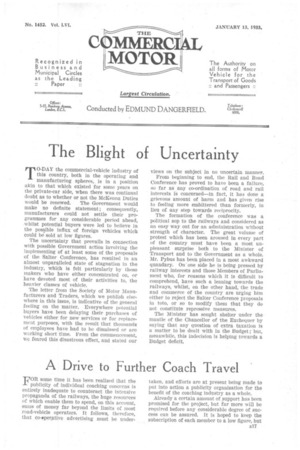The Blight of Uncertainty
Page 31

If you've noticed an error in this article please click here to report it so we can fix it.
TO-DAY the commercial-vehicle industry of this country, both in the operating and manufacturing spheres,. is in a position akin to that which existed for some years on the private-car side, when there was continual doubt as to whether or not the 1VIclienna Duties would be renewed. The Government would make no definite statement; consequently, manufacturers could not settle their programmes for any considerable period ahead, ,whilst potential buyers • were led to believe in the possible influx of foreign vehicles which could be sold at low figures.
The uncertainty that prevails in connection with possible Government action involving the implementing of at least some of the proposals of the Salter Conference, has resulted in an almost unparalleled state of stagnation in the industry, which is felt particularly by those makers who have either concentrated on, or have devoted most of their activities to, the heavier classes of vehicle.
The letter from the Society of Motor Manufacturers and Traders, which we publish elsewhere in this issue, is indicative of the general feeling on the matter. Everywhere potential buyers have been delaying their purchases of vehicles either for new services or for replacement purposes, with the result that thousands of employees have had to be dismissed or are working short time. From the commencement, we feared this disastrous effect, and stated our views on the subject in no uncertain manner.
From beginning to end, the Rail and Road Conference has proved to have been a failure, so far as any co-ordination of road and rail interests iS concerned—in fact, it has done a grievous amount of harm and has given rise to feeling more embittered than formerly, in lieu of any step towards reciprocity.
The formation of the conference was a political sop to the railways and considered as an easy way out for an administration without strength of character. The great volume of protest which has been aroused in every part of the country must have been a most unpleasant surprise both to the Minister of Transport and to the Government as a whole. Mr. Pybus has been placed in a most awkward quandary. On one side he is being pressed by railway interests and those Members of Parliament who, for reasons which it is difficult to comprehend, have such a leaning towards the railways, whilst, on the other hand, the trade and commerce of the country are urging him either to reject the Salter Conference proposals in toto, or so to modify them that they do not constitute repressive measures.
The Minister has sought shelter under the mantle of the Chancellor of the Exchequer by saying that any question of extra taxation is a matter to be dealt with in the Budget ;• but, meanwhile, this indecision is helping towards a Budget deficit.




























































































